#kent allard
Explore tagged Tumblr posts
Text

The Shadow by Jim Steranko.
51 notes
·
View notes
Text


1988's The Shadow Vol.3 #9 cover by cover artist Kyle Baker. Source
#The Shadow#Kyle Baker#dc comics#DC#dc#comics#comic art#dc comics of the 1980s#comics books#cover#1980's#1980s#pulp heroes#comic books#80's#80s#shadow#Kent Allard#80s comics#1980s comics#Andrew Helfer#The Shadow by Andrew Helfer#cool comic art#cool cover art#comic covers#The Shadow by Kyle Baker#so talented#big cape#comic book cover art#art
25 notes
·
View notes
Text

is this how people rediscover Kent Allard
46 notes
·
View notes
Text


#pulp#the shadow#the shadow 1994#kent allard#ying ko#🎭#love pulp backstories#they do it because they want to and their love for humanity#love to think that Shadow has always been like that even beford WW1#like hes just like that
9 notes
·
View notes
Text
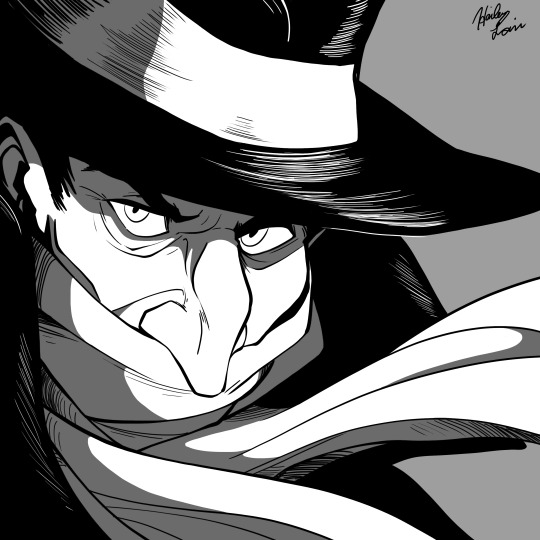
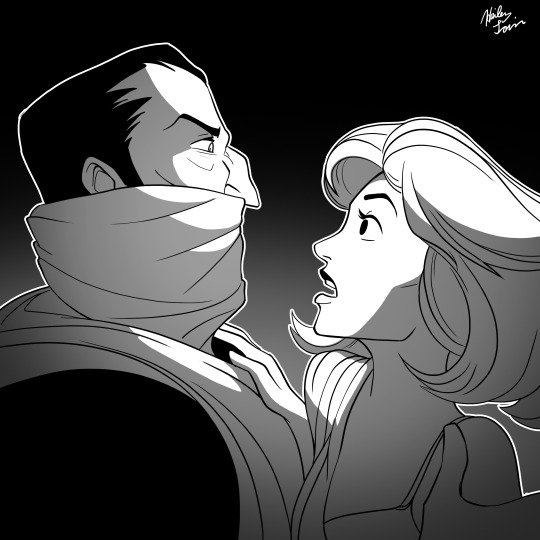
Drawings of "The Shadow" from some recent "Off the Cuff" episodes! You can check out my process for these here!
112 notes
·
View notes
Text
Gathering of the Greatest Gumshoes - Number 4
Welcome to A Gathering of the Greatest Gumshoes! During this month-long event, I’ve been counting down my Top 31 Favorite Fictional Detectives, from movies, television, literature, video games, and more!
We're nearing the end of this event, my friends.
SLEUTH-OF-THE-DAY’S QUOTE: “The Weed of Crime Bears Bitter Fruit.”
Number 4 is…The Shadow.
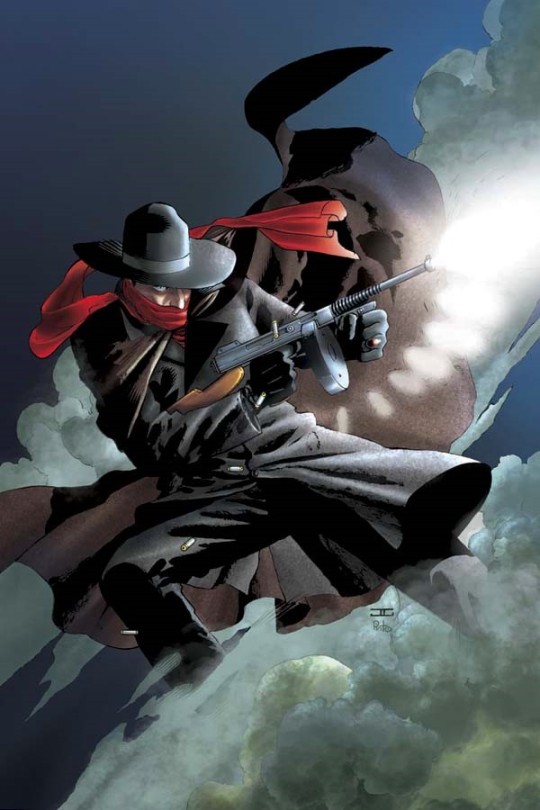
I’ve talked about the Shadow at least a few times in the past (more frequently than that with those closest to me), but for those who are unfamiliar with the character and his world, here’s the basics: the Shadow is a character many consider to be the father of the modern superhero. Several famous “super detectives” take inspiration from the character, either directly or indirectly: most famously, the Shadow was a major inspiration for none other than the Dark Knight himself, Batman. However, his influence can also be seen in characters like the Punisher, Daredevil, various Alan Moore creations (such as Rorschach and V from V for Vendetta), and even freaking Darkwing Duck!
The Shadow was originally created as the narrator/host for a series of crime and horror radio dramas sponsored by a company called Street & Smith. The character became so popular, the company decided to expand on the concept, and began to publish a pulp magazine focused on the character and his adventures. Writer and illusionist expert Walter B. Gibson – working under the pseudonym “Maxwell Grant” – developed the character accordingly. Gibson decided he wanted to create "a hero who had some of the villain's appeal," citing that villains were usually more interesting than typical heroic protagonists. Taking inspiration from his knowledge of stagecraft and the occult, as well as various pieces of classic literature - including Sherlock Holmes, Dracula, Phantom of the Opera, and The Scarlet Pimpernel - Gibson turned the ephemeral narrator figure into a "weird avenger of evil," arguably just as scary as the crooks he fought.
Such was effectively the birth of the Shadow as a fully-formed character. This version got his start in the pulp magazines, most of which were written by Gibson. He was later reimagined for a new radio program, and since then has appeared in a few movies (the most well-known being the 1994 feature starring Alec Baldwin). However, the character – originally created in the 1930s – has survived most prominently via comics. The current company with the rights to the character in comic format is Dynamite Entertainment, but the Shadow has also belonged to DC, Marvel, and Dark Horse at different points in his long career.
The Shadow’s true identity is “wealthy young man-about-town” Lamont Cranston (at least in the radio shows and all the film treatments; the comics and pulps are more complicated). By day, Cranston is a laid-back member of New York City’s elite. However, this demeanor hides a dark side, created by an even darker past: once upon a time, the man who would become the Shadow was a fighter pilot in WWI. His plane crashed in Tibet during a mission, and he was presumed killed in action. Different interpretations of his origins change up what happened next, but one thing is consistent: for the next seven years, he lived in Tibet, and during that time he experienced “all the evil that lurks in the hearts of men.” He eventually met a mystic known as the Tulku, who not only taught him martial-arts, but also gave him the ability to “Cloud Men’s Minds.” With his newfound skills, he returned to New York and became the Shadow: forever bound to an immortal quest to destroy evil.
The Shadow's power to “Cloud Men’s Minds” is less pretentiously described as him having various psychic abilities. He can project illusions, hypnotize people, control their minds, and make himself seem invisible (or, appropriately, like a living shadow), just to name a few examples of his talents. However, while these abilities are certainly useful ones, the Shadow is also skilled in other, more traditional fields: he is a fine marksman, as skilled with his dual-wielding silver-plated pistols as he is with a rifle or machine gun. His learning of the martial arts makes him a skilled melee warrior, and he has at least some knowledge of various sciences (how much varies from version to version) and forensic techniques. The Shadow is also aided by a veritable army of Agents: people he has saved in the past who now do his bidding, acting as his eyes and ears. Probably the most noteworthy are Margot Lane (a glamorous young lady who is his love interest), Harry Vincent (the Shadow’s chief spy, who really only shows up in printed material), and Moe “Shrevvy” Shrevnitz (a cabby who is essentially the Shadow’s chauffeur).
The most interesting point about the Shadow, and where his character’s development shines most intriguingly, is his morality: the Shadow is an objectivist character, who acts as an agent of vengeance against all wrongdoers, no matter the mitigating circumstances. Some would say this is inaccurate, but I would say the Shadow best counts as an anti-hero. He sees the world often in black and white, and obsessively and downright SADISTICALLY faces his opponents. He delights in taunting them with purple prose, laughing as he leads them to destruction, and is often just as frightening as the villains he defeats. Under the surface, there is a soft side to his soul…but if you’re a supervillain, a gangster, or anyone else who might cross his path, start praying.
“For who knows what evil lurks in the hearts of men? The Shadow Knows! HA HA HA!”
Tomorrow, the countdown enters the Top 3!
CLUE: “It is the brain, the little grey cells, on which one must rely.”
#list#countdown#best#favorites#top 31 fictional detectives#gathering of the greatest gumshoes#number 4#the shadow#the shadow knows#kent allard#lamont cranston#radio#pulp fiction#comics#movies#film#serials#walter b. gibson#maxwell grant#mystery#crime fiction#superheroes#noir
3 notes
·
View notes
Text

Comics I recently added to the GCD: The Shadow Annual 2013
Added the series and indexed it. Actually wrote a decent summary of it too.
1 note
·
View note
Text

The Shadow, on his way to teach the children what evil truly lurks within the hearts of men
1 note
·
View note
Text
The Shadow #8 ‘The Night of the Mummy!’ (1974) by Denny O'Neil, Frank Robbins and Jerry Serpe. Edited by O'Neil. Cover by Robbins and Tatjana Wood.

The Shadow issue 8, Dec-Jan 1974
Frank Robbins Cover Art
#the shadow#kent allard#lamont cranston#margo lane#dc comics#denny o'neil#frank robbins#jerry serpe#tatjana wood#who knows what evil lurks in the hearts of men?#the shadow knows#bronze age comics#comics
80 notes
·
View notes
Text


Sundance / Fitzgerald's / The D
Photos: Sundance in 1980, before opening, and during construction of the second tower in '81. (Review Journal)
Nevada Building ('56-'78)
'56: Nevada Building, a 4-story office & retail space designed by Zick & Sharp opens in Apr. The owner-developer is not clear. In '62, Three-O-One Corp (Moe Dalitz, Allard Roen, Israel Alderman) are cited as the owner of the Nevada Building at this time. (RJ 3/8/56, RJ 10/9/62)
'78: Jan., First word of the hotel in the press. Moe Dalitz will build the hotel, with Herb Tobman and Al Sachs operating the hotel & casino. “Tobman and partners Al Sachs and Fred Richmond have plans … for a 300-room hotel.” A later piece in the Review-Journal states Tobman & Sachs first proposed the Sundance in '76, that they owned the Nevada Building and had acquired the adjacent properties. (RJ 1/22/78, RJ 7/3/80)
'78: Nov., Nevada Building demolished. (RJ 11/8/78)
'79: Jun., Carrao Construction Co. begins work on Sundance. (RJ 6/17/79)
'79: Sep., Dalitz requests $27M loan from the state Retirement Board for the hotel construction.
'80: Jun. 19, Dalitz called by Gaming Control Board for licensing because of a guaranteed a line of credit to operators Sachs & Tobman. Sachs (57.5%) and Tobman (32.5%) have already been approved. (The other 10% owners, not accounted for in the press.) The Dalitz probe is put on hold ultimately never appears before the board before Jackie Gaughan leases the casino in '84.
Sundance ('80-'87)
'80: Jul. 3, Sundance opens. The hotel has one tower, 17 floors, 290 rooms, and a 450-space garage. Following the MGM Grand fire later in the year, Sundance is cited by Las Vegas Fire Marshal Ned Backer as the only downtown hotel to meet all fire-safety features required under building codes adopted by the City Commission in Jul. '79, "a firefighter's delight." (RJ 11/28/80)
'81: Construction of the second tower begins in Jan., completed in Nov. The 34-story, 360-room, 400-foot tower is the tallest in downtown Las Vegas. Total rooms: 650.
'83: Jun., Sundance leased to Jack Pieper.
'84: Jul., Sundance leased to Jackie Gaughan and El Cortez management, as court-appointed supervisors.
'86: Dec. 1, Lincoln Management Group of Reno's Fitzgerald's Hotel, takes over Sundance lease as court-appointed supervisors.
Fitzgeralds ('87-2012)
'87: Oct., Lincoln buys Sundance. Las Vegas City Council approves name change to Fitzgeralds in Dec. Facade renovation is approved by the city 2/3/88.
'96: Nov., Corner marquee changed with 120-ft rainbow and 35-ft “Mr O'Lucky” charactater.
2001: Dec., Fitzgeralds Las Vegas bought by Don Barden, Majestic Star Casino, LLC, along with Colorado and Mississippi properties. Barden becomes the first African American casino owner in Las Vegas.
2002: Mr. O'Lucky removed from the sign. Later destroyed by fire at the Neon Museum in 2004.
2003: Barden separated Fitzgeralds Las Vegas from the Majestic Star umbrella.
2011: May 19, Barden dies.
2011: Oct., Barden estate sells Fitzgeralds to Derek and Greg Stevens.
2012: Fitzgeralds rebranded as The D.
New Building. Review-Journal, 3/8/56; Jud Wanniski. Reporter's Notebook. Review-Journal, 10/9/62; Charles Zebell. Downtown Vegas stores flee to suburbs. Review-Journal, 1/22/78; Sale Today, Gone Tomorrow. Review-Journal, 11/8/78 p11; Going Up. Review-Journal, 6/17/79; Kent Lauer. Dalitz asking for $27 million loan. Review-Journal, 9/19/79 p1; Clyde Weiss. Dalitz called for licensing. Review-Journal, 6/19/80 p3; Sundance Hotel guided by experienced team. Review-Journal, 7/3/80; Sundance Hotel and Casino opens doors. Review-Journal, 7/3/80; Mark Dent. Few downtown high rises meet safety codes. Review-Journal, 11/28/80 p1; Sundance is one of the world's safest hotels. Review-Journal, 3/15/81; Reno operator named to supervise Sundance. Review-Journal, 11/26/86; Ed Vogel. Control Board OKs sale of Sundance. Review-Journal, 10/1/87; Diane Russell. City Council. Review-Journal, 12/18/87; Caitlin McGarry. Audacious D. Review-Journal, 3/13/2012.
30 notes
·
View notes
Text
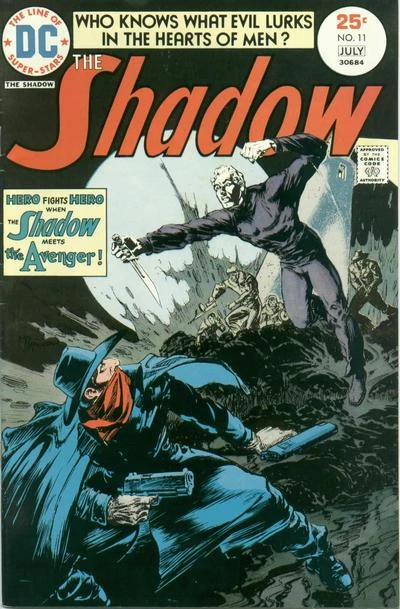
THE SHADOW (vol. 1) #11 (July, 1975). Cover by Michael Wm. Kaluta.
The Shadow meets another Street & Smith pulp hero, The Avenger, in this crossover.
The Avenger had only just debuted the previous month in Justice, Inc. (vol. 1) #1 (June, 1975). The powers that be hoped that having him appear in the pages of the more familiar character, The Shadow, would boost his visibility.
Sadly, it didn't work as Justice, Inc. only lasted four issues. The Shadow only lasted one more issue after this one, and then was cancelled.
The Shadow, and Street & Smith's other powerhouse, Doc Savage (who was over at Marvel Comics at the time), would have more luck at DC in the late 1980s/early 1990s. The Avenger, on the other hand, just never seemed to gain much traction with comic book readers.
#The Shadow#Lamont Cranston#Kent Allard#The Avenger#Richard Benson#Justice Inc.#Street & Smith#pulp heroes#DC Comics#Bronze Age comics#Michael Wm. Kaluta
45 notes
·
View notes
Text
oc tag game ♡
Tagged by @saltwife, I guess I can tag umm, @thelovers-thedreamers-and-me and idk idk @crippledpastrycryptid and @fealiniel if you have ocs you'd like to gush about! And if you have ocs and I didn't tag you go for it :x
General:
Name: Lamont Vincent Allard Machel, Marquess of Stillmarch
Alias: mostly N/A but I have an ongoing AU where he has a disguised alter-ego known as guy deVille
Gender: Male
Age: 20
Spoken Language: Nerathi Common
Sexual Orientation: bi/pansexual - I'm not sure he'd understand the difference
Occupation: Commissioned officer (Lieutenant) in the Nerathi army. Technically he has a troupe of light cavlary under his command, but that didn't really work out, and he is getting transferred the diplomatic (intelligence) corps.
Favourite:
Colour: Green, because everyone says it looks good with his eyes (they are correct).
Entertainment: He likes small social gatherings and going to private clubs. Gets overwhelmed by crowds and avoids them when he can. He does enjoy things like plays and opera and other performance based entertainment, but only with a private booth. Lucky he is insanely rich.
Pastime: Riding, martial training, embroidery, reading (mostly non-fiction prose and poetry), sex. You've got to stay busy or the Thoughts will get you.
Food: The man in a fruit goblin. He stress-fasts (not on purpose) but can usually be enticed to eat if there is fresh fruit involved, especially cherries. Also, cheese. Otherwise he does not have a very adventurous palate.
Drink: Yes! he is partial to the ciders that are brewed on his estate, as well wine and brandy. Not so big on whiskeys and related things after youthful overindulgence.
Have They…
Passed University: Yes, fortunately it wasn't the sort of place where grades mattered significantly, but he attended a prestigious military academy in order to prepare him for his service. he took it a lot more seriously than many of his peers. he was not an exceptionally brilliant student, but he put in the work.
Had Sex: Yes!
Had Sex in Public: Despite the inclinations of his husband... no.
Gotten Tattoos: Not a tattoo, but he does have an extensive magical mark on his right upper thigh (a dragonmark) that people might think is one if a: they ever saw it and b: they didn't know enough about the Nerathi aristocracy to guess otherwise.
Gotten Piercings: No.
Gotten Scarred: Not on purpose. or - only emotionally? He lives in a world of magical healing and he is rich and noble, so unlikely there is anything physical that stuck.
Had a Broken Heart: Yes but it got fixed :3
Are They…
A cuddler: Yes, in private. Too formal/stuffy for PDA though.
Scared Easily: Sort of - he suffers from magically inflicted anxiety that makes him a little bit psychic. So not prone to jumpscares and such but on a deeper level, yes.
Jealous Easily: The first person he ever fell in love with was a polyamorous priest of the elven god of love and beauty, so he had to work on that. But he did, and it allowed him to let a second love into his own life to whom he is now married. He has deep seated insecurities and abandonment issues (people he cares about keep dying), but he's less concerned that his partners will leave him for someone else.
Trustworthy: Over all, yes, very, but he's also bad at talking about his problems which can lead to keeping unfortunate secrets. Also because of his work, he's not always at liberty to be forthcoming.
Family
Sibling(s): Two brothers The eldest, Arnaud Layne Allard Machel, died in a "accident" several years before. His younger brother, Frederick "Fritz" Harold Allard Scrye, is about 4 years younger, and lives with their mother.
Parents: His father (Kent Allard Machel) died when he was five in an airship accident on the way home from a diplomatic posting overseas. His mother (Margaret "Margo" Layne Allard Scrye) quickly remarried (pressured by House politics), taking her youngest child with her and leaving the older two in the care of their (terrible) uncle, Thurston Allard. Thurston resented the burden, especially as his brother's title and estates passed directly to the children.
Children: None yet
Pets: A Complete horseboy. His horse is named Briar (at least for short, she probably has a stupid long formal name I've never bothered to make up), she's a chestnut mare, a well-bred light warhorse of some kind (I don't know the flavours of horse, and this is fantasy anyway) that he trained himself . They are very bonded, and she doubles as an emotional support horse for him.
#lamont#oc asks#tag game#yes he and all his family are named after people in The Shadow#he *can* see what evil lurks in the hearts of men#it is very stressful actually
6 notes
·
View notes
Note
Has anyone asked what do you think Kent Allard/The Shadow was like as a child or a teenager? What kind of personality (courteous or crude, grandiose or grounded?) did he had, and how did carry over to his latter life?
Nobody as of yet, because this is the kind of thing that tends to be viewed as complete hardline sacrilege by Shadow fans, and for some fairly self-explanatory reasons it's gone completely unexplored in any official material for about 90 years now (besides like one scrap of dialogue in a deleted scene from the 1994 movie). Nobody's yet pulled that trigger and botched a retelling of a childhood for The Shadow, and I don't think anyone's looking to be the first.
Naturally, you can imagine that I do practice heresy on the regular and have spent a lot of time thinking and crafting ideas for that part of the character's life, most of which I'd like to keep to myself for now, although whether I'd even actually use them if I could, is another thing entirely. Not that I need to, but I do like to have some basis for whenever I go into headcanon territory, so we're gonna get into those:
Fittingly, as far as I can tell, the only two bits of concrete information we've ever received in the pulps were related to Lamont Cranston: one bit in House of Shadows that mentions Cranston's fortune was inherited, and the famous "Lamont Cranston Talks To Himself" scene in The Shadow Laughs where The Shadow mentions that he knows Cranston's family history better than he himself. We can extract that Cranston at minimum has a family history of fortune and privilege, and presume he has still living relatives.
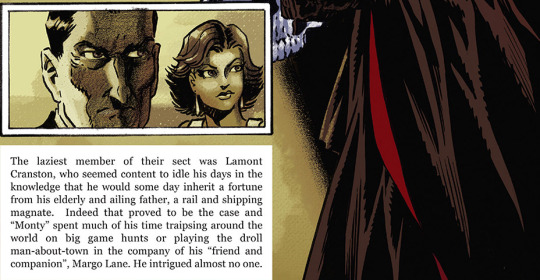
Some people call me The Shadow. That is but one identity. I have other personalities that I assume, as easily as I don my black cloak and hat. One of my personalities is that of Lamont Cranston. In the past, I have used it while you were away. At present, I choose to use it now.
You have some knowledge of Lamont Cranston's family history. I doubt that you could recall the maiden names of both his grandmothers. I know them. - The Shadow Laughs
The question of what young Kent Allard would be like largely hinges on just how gradual was the shaping of his personality, or whether he was just on some level always Like That, and it points both ways. I've talked a lot about how The Shadow's backstory lacks that one defining moment that's supposed to provide a clear separation between who he was then and who he is now, and there really isn't one thing that makes or breaks The Shadow, so much as a series of events and processes that led him across the years. It's a sandbox backstory.
But let's look at some things that could be used to inform a reading of what Kent Allard might have been like in those formative years
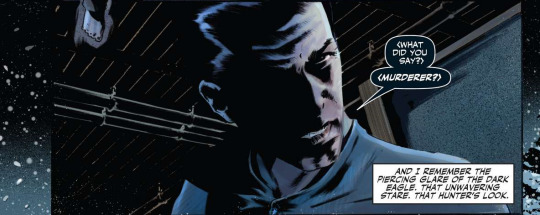
Way before he was The Shadow proper, he was already redefining his presentation depending on his surroundings. As Gibson once remarked on the character, "Always, his traits and purposes were defined through the observations and reactions of persons with whom he came in contact". Kent Allard the famed war hero was one name, but he went by others like Clifford Gage the American explorer who would first meet Lamont Cranston amidst his journeys to India and Tibet. Blanton the Frenchman who would conduct missions in Monte Carlo with a man who would later call himself Cliff Marsland. Whoever he went by in his time within the deep court of Tsarist Russia, and his later claims to have names given to him across the world and be able to be recognized no matter what tribe or city he goes into, and so on.
(Relevant to the above: The Dark Eagle was a name given to him by his enemies, and it's unclear how much was it a codename or a separate identity, since certain characters connected The Dark Eagle to The Shadow, but never to Kent Allard, and of course it's because Allard was a soft retcon, but still. He never actually called himself The Shadow in the first book either, it was a name first uttered by Harry Vincent that Claude Fellows and the story's gangsters coincidentally also picked for him, he'd only embraced it later).
He was doing Shadow things decades before actually being The Shadow, like donning black-garbed disguises to rescue Allied prisoners from German camps, engaging in hard-fought battles under the cover of darkness, throwing himself into dangerous situations to protect others and/or for the thrill of it, and his backstory reads a lot like The Shadow was something in the blueprints of his life for a while, whether he knew it or not.
EXTREMELY precocious, at minimum, and he clearly didn't pick up his skillset from standard military training. Gibson placed the character's birth around 1892, which means he was doing all of that work in Russia, befriending the Czar and embedding himself into a secret spy order meant "only for the most trusted members of the regime" even while known to be the agent of another government, barely into his twenties and barely old enough to enlist at all (assuming he didn't lie about his age), to say nothing of all the other legendary things he'd go on to accomplish before settling in America. He's either just that supernaturally good at learning on the fly, or he clearly had some kind of background learning and training in some of these things before he enlisted, which begs the question of who would even teach him, but the word precocious has been attached to Kent Allard's early backstory quite a few times.
He takes to aristocratic characters with ease. Lamont was said to be his preferred or even outright "favorite" of disguises, and he has several other personalities that are basically just Lamont with a different name (some take this as proof that he had to have been raised as an aristocrat, but I'd argue it points to the opposite).
He likes to dwell within dark, silent places, not just to get work done. He feels at home within it. This isn't just a matter of efficiency and such, Gibson describes quite frequently that The Shadow enjoys dwelling in the kinds of dark, silent, gloomy locations he most blends in. The Sanctum itself is almost comparable to a sensory-deprivation room and it's where he goes to do his best thinking. Nothing else ever merits this kind of description of him, of anything feeling "like home". "To The Shadow, stealth was an instinctive possession. When garbed in his accustomed attire of black, he became a part of the night itself". "Surrounded by the blackness which to him was home." - The Shadow's Shadow "Gloom enclosed about the visitors, for the building blocked the rays of the sun. There was something somber about the atmosphere that chilled Eric Delka. The Shadow did not feel the same sensation. Instead, the smile reappeared upon his lips. This was an atmosphere of mystery that carried the touch of darkness. Such elements were to The Shadow's liking" - Castle of Doom

There's also the Street & Smith "Clews": This was part of a campaign ad released before The Living Shadow to help promote it, as listeners of S&S's radio program were supposed to be on the lookout for clues that The Shadow would randomly state in regards to who he was or what he looked like, you can read them in full here along with ensuing theories about The Shadow's early life. Some of these don't seem to have carried over much to the pulps proper and how Gibson presents him, but as a whole they were never "discontinued" either. Most of these are fairly evident in the pulps as is, but there are others that either come up very rarely or simply did not come back at all:
He has a cobra tattoo on his chest. He plainly does not have this in the pulps on the few occasions his torso was exposed.
He says he has "artistic hands" and plays cards with them.
He is blond and dyes his hair to hide "my Nordic forbears"
"Like a bird, I take to the air when seeking out a lair" I think this carried over to him becoming an aviator but "seeking out a lair" is a weird phrasing.
He is a fastidious dresser, citing Beau Brummel in tastes, who's known for having defined the modern image of the dandy. He also has slim feet ("8 triple A, the salesmen say")
He attained a Bachelor of the Arts degree at the age of twenty and is currently forty. This was way before Gibson assigned him a birthdate decades later, but it matches with the 1892 date provided.
He practiced rowing in college. The clues describe him as tall ("Low doorways please me not"), athletic and slim enough to squeeze through prison bars, which matches his pulp body type (he'd perform a far more impossible feat of contortion in one story much later). The article above uses this clue to argue pretty convincigly that The Shadow would have gone to Princeton.
Now, these are in a very ambiguous position because they're attached to a version of the character right in the middle of transition from spooky radio narrator to pulp crimefighter, and it's unclear how much if at all Gibson even used them. But they exist, and you could make them out to be facts about Allard's life, or Cranston's life, or things The Shadow made up based on former identities. Point being, it's one thing we can use to piece together things about his first 20-or-so years.

"I'm not sure about Cranston," he said seriously. "The man is famous in a way. Too famous!"
"Famous for what?"
"For his adventures all over the world. He has money, yes, which he is supposed to have inherited. But the records on the subject are very meager.
"I think that Cranston may be an adventurer in more ways than one." - House of Shadows
Cranston's upbringing should also be relevant here, because what little we do can already be a bit telling: Lamont Cranston was raised in a wealthy Jersey mansion and supposedly inherited his fortune from a family with a certain amount of history, but he's become famous for spending all of his time globetrotting and staying everywhere but home, dodging responsabilities to go shoot elephants or climb mountains in the Himalayas with his trademark leisurely, detached demeanor, barely in touch with his own family or tax records. A man who has "many friends, but none who know him well". Cranston did most of the work dissappearing from his own life and country, and half of why he and Allard have that set-up is because of that, and because Cranston quickly and even happily agrees to it. The real Lamont Cranston is completely fine with another guy doing being Lamont Cranston for him.
And a final addendum: For the most part I'm ignoring what the 1994 movie and it's different takes in comics and novelization did, but the novelization did provide a little bit of background for the Cranston family that we could go with in the absence of anything else:
Cranston was everything Allard wasn’t: privileged, pampered, opportunistic.
The Cranston fortune had been made in railroads and manufacturing, among other things, and had survived Black Friday by dint of the late Theodore Cranston’s uncanny knack for the market. Cranston was one of few New Yorkers who hadn’t sold his property to a developer because of the servant problem, or the escalating costs of maintaining fifty rooms in the heart of a thriving city
Family heirlooms handed by several generations of Cranstons. The house had the look and feel of permanence, as if the Cranstons were only the latest in a long and continuing line of distinguished occupants.
Now, some have said that Allard must have been raised an aristocrat, which makes sense but, The Shadow's aristocrat leanings are always in the form of him playing a character, and characters he's quite fond of but are always a mask he's putting on. And if Allard is meant to be different from Cranston (otherwise he's redundant as an identity), whether he's a world-renowned hero or a faceless, injured nobody, it stands to reason that he should have a fairly different upbringing than Cranston's. As The Shadow or whatever else, he relates to his own life in a completely different sense, completely buried in his duty to justice and the responsability he takes to others within it, protecting everyone while Cranston barely cares to protect himself (notably, when he does do it in The Hydra and has to kill a man with an elephant gun, he almost immediately starts feeling bad over his game hunting sports compared to what The Shadow's been doing).
So let's gather up some of our homework so far: We know Lamont Cranston has a family history from which inherited his fortune, that he was born into privilege and went on to live apathetically numbed by it. We know Kent Allard is not Lamont Cranston. We know he's had a proclivity for disguises and reshaping his identity long before he became The Shadow proper, and that just as now, most of his personas are either based on existing people or named by his enemies. We know he was doing quite a lot of things that pointed to his becoming The Shadow down the line, but that there was clearly a long process to get there and there's no clear moment where he truly becomes The Shadow, not even when he buries Kent Allard in that Guatemala plain crash.
We know he was highly precocious, enlisting and getting drafted into performing extraordinarily dangerous spy work from a very young age, and that he's apparently always had a strong sense of duty towards others, this being part of why he rejected becoming a mercenary after the war (although he still considered it). We know he likes impersonating and performing wealthy characters and he's mastered upper-class mannerisms so thoroughly to the point he can seamlessly blend in and make aristocrats, Russian or American or otherwise, mistake or accept him for one of their own. We know he likes to stay and plan and rest within dark, silent places others would find eerie or uncomfortable to stay in, and that he feels at home the most within total darkness.
And from those early contest clues, he claims to have been a rowing athlete at college and he claims to be fastidious and well-dressed, and combined with the above this points to him having either been raised in strict, aristocratic fashion, or precisely the opposite and it being something he had to learn and master just as he learned and mastered countless other skills of disguise and mimicry, or somewhere in between. He claims to have attained a Bachelor of Arts degree fairly young as well, and describes having "artistic hands". And he claims to be naturally blond and to have a cobra tattoo on his chest.
Again, I'm not getting into my headcanons for his family life and other things I'd keep to myself, but still, what do I think young Kent Allard's personality was like? Well, to keep it short, I'll think of a few things.


I think those might have been the closest years he ever had to something resembling normalcy, and it wasn't meant to last so, maybe they should be good ones, no?
I think he was raised decently, and I don't think he was raised rich with money, not during his earlier years. Other things, most definitely, but I think he had to learn a lot about how to deal with money, and this is part of why he's ultimately able to better handle Cranston's money as well as never need it and have his own undisclosed personal fortune.
I think he had to learn a lot about how to deal with people, and fighting, and mimicry, and interpersonal relationships, and aviation, and any other number of skills and things that he'd be highly proficient at barely entering adulthood and that he'd have to rely and develop so much to save his life again and again. He is restless, genial, unsuited for settling down and staying still, always thinking and planning and researching, and he most likely was always like this one way or another.
I like to think of him as having been raised mostly by his mother for several reasons, one of which being a point of contrast with Cranston's father, and maybe there were other hands on deck trying to steer his development for better or worse, but it was definitely her first and foremost. I think it was a different upbringing than you'd expect someone like him to have, maybe one that separated him of some opportunities but definitely prepared him more for those he'd give to others. I will put my foot down on just one idea, and it's the idea that he lost his parents or is driven by the loss of them: that's someone else's thing, it's never been a factor in his driving motivations and it doesn't need to be.
He grew up in an imperialistic America adapting to labor confrontations and conflicts posed by the Industrial Revolution, and I think he was no stranger to evil or injustice from an early age, and that burying Kent Allard was a decision made with a long history and experience showing him it had to be done, but that he was still very green around the gills before the war, more prepared than most but still initially out of his depth in the face of such callous, monstrous, pointless cruelty. He most certainly did not grow up knowing he'd be The Shadow, but I think he grew up knowing he'd have to be something, because being nothing, and thus doing nothing, was not an option. Maybe that was an option for the wealthy young man about town who lived elsewhere with a different name, but not for Kent Allard.
I think he had more of a sense of humor than he lets show nowadays, that the laugh was just always the language he'd prefer to use the most, same as is now. I think he had a fondness for stagecraft and arts, maybe was raised close to it, and that so much of his extensive repertoire of skills and disguises started there, and that maybe he still somewhat treasures that Bachelor of Arts degree, even if the man who worked to get it, to get into a prestigious college and had friends and a winning team and things to call his own, can't really exist anymore.
But he was there once.
I think he had things he loved very much and would have laid down his life to protect, whether they were still around for his adulthood or not. Good parent or parents, good friends, a good home, good experiences, good dreams. Maybe not all at once, but certainly they were there, and they mattered. They had to, he had to have had something, because I don't think there was ever a time where Kent Allard never had any enemies or people trying to hurt him one way or another.
"put The Shadow anywhere, in any locale, among friends or associates, even in a place of absolute security, and almost immediately crime, menace or mystery would begin to swirl about him, either threatening him personally or gathering him in its vortex to carry him off to fields where antagonists awaited."
We can never know the full extent of it, but however his life was like from childhood to adolescence, and whatever happened to him to lead him to mature so fast and ultimately enlist so early with such impressive and dangerous skills, I think Kent Allard had good times.
Or maybe I just want him to have had good times once, before what became of his life, before the war swallowed him and his own choices made all he was before an irrelevant trivia of weakness he can never admit to because it undermines the very foundation of The Shadow as an unknowable force of nature and mystery, in-universe and outside of it, and so it needs to be buried and wiped and erased.
But before the war and the spy and soldier work and the travels and the dark missions and the faked deaths and the arrival of The Master of Darkness to be all that he was, is or would be, there had to be a time where he knew something else besides those things. There had to be a time where The Shadow knew something besides being The Shadow. Because becoming The Shadow was, above all else, his choice. That which he stated the one and only time he made it a point to unmask and give us the truth about himself:
"I chose that mission."
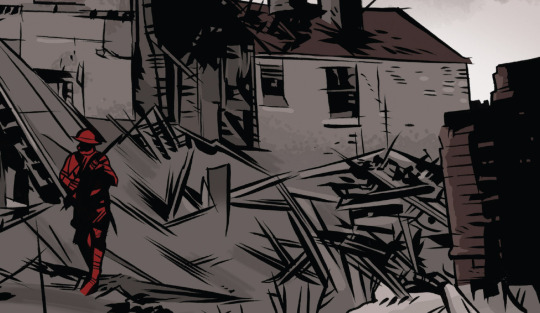
You must treat the character as a discovery,rather than your own creation. Treat him, not just seriously, but profoundly.
Picture him as real and beyond you, in mind as well as prowess.
Feel that however much youhave learned about him, you can never uncover all.. - A Million Words a Year for TenStraight Years, by Walter Gibson (Writer’s Digest,March 1941) )
#replies tag#pulp heroes#the shadow#pulp fiction#shadow comics#shadow pulps#the shadow magazine#kent allard#lamont cranston
28 notes
·
View notes
Text
Mario Kart 9 roster

#🖍#i lost the refs in the last one so heres something else#i hate finding references#i hate finding reference#i hate finding refs#i hate finding ref#pulp#the shadow#the shadow 1994#lamont cranston#kent allard#ying ko#kid cranston#🎭
9 notes
·
View notes
Note
Please do The Shadow! I would like the Foundation talking about his Girasol Ring, his psychic abilities including mind reading, mind control, perception distortion, and turning invisible or the way he puts it 'to cloud men's minds.'
Be sure to include his vigilantism, his urban legend of a shadowy protector and his network of agents on his side.
I love him so much and it will be neat to see him in scp foundation ❤️❤️❤️
Oh! And make sure he's Kent Allard, got it?

I MIGHT do so in the future, but for now, the answer is no. Sorry.
2 notes
·
View notes
Note
I just want to let you know that I was part of a Call of Cthulhu campaign (it's on hiatus, sadly) that takes place in the 1930s. So me being the nerd I am, made my character a pilot and named him after Miles Crofton and Kent Allard.
His name is Miles Allard. His nickname is Duck. I really miss playing him.
Neat! Sad that the game is on hiatus, I know that pain all too well T.T That seems like a solid character concept, and I like 'Duck' better as a nickname/callsign than Eagle, seems way more like a nickname someone would actually get from his pals lol. (Also I knew there was a pun there somewhere but it took me five minutes after posting this to finally put it together. M Allard. I love it.)
I haven't played CoC myself yet but I did recently play Achtung Cthulhu (ww2 and more of a pulp-thriller vibe than a horror vibe) as a pregen who I played as Basically Hawkeye
(My worst-kept ttrpg secret is that 90% of my long-term characters start as reskinned blorbos. ...I might add onto this with a very long art-filled ramble about some of them. There's at least two inspired by Hawkeye, two Shadows, and one Clyde Burke.)
4 notes
·
View notes